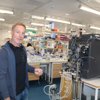-

How the Nobel discovery is used in drug development
Regulatory T cells keep the immune system in check, a discovery now awarded the 2025 Nobel Prize in Physiology or Medicine. Qiang Pan Hammarström explains how this finding is being applied in today’s drug development, and what challenges remain.
-

Billion-Dollar Deal Sends BioArctic Soaring
Swedish Alzheimer-focused company BioArctic has entered into a licensing collaboration with Novartis regarding a technology aimed at enhancing efficient drug delivery to the brain. The BioArctic stock surged significantly following the announcement.
-

Developing rapid diagnostics for sepsis – “Every hour counts”
Finding the right antibiotic in the right dose – with an ultra-fast analysis method. Gradientech's product solution is currently used in routine diagnostics at several hospitals in Europe – and the next target is the US market.
-

First preterm infants study – a vital step for Neola
After years of developing an advanced lung monitoring system, Neola Medical has received some delightful news: permission to start its first clinical study on preterm born infants.
-

Life science trends 2025 – Part 1 obesity drugs
More obesity drugs are being launched this year following Novo Nordisk and Eli Lilly's previous successes with GLP-1 drugs. But the next big breakthrough in obesity has a different mechanism of action, writes Samuel Lagercrantz in the first article in a series of trend insights for 2025. Today: obesity.
-

“Research is always a lot of failures and a few successes”
Gene therapies open up fantastic possibilities, but they are also extremely expensive to produce. Genenova aims to change that and make the treatments accessible to more people. “Our overall ambition is to reduce costs a hundredfold”, says professor Johan Rockberg at KTH Royal Institute of Technology in Stockholm.
-

“Conducting research at universities is becoming more and more like working at a research hotel”
The government wants Swedish research to focus on excellence and innovation, but can the two be combined? Life Science Sweden talks to Anna Falk, a professor at Lund University, about research policy, the constant hunt for funding in academia and what constitutes ‘fine research’.
-

From Valneva to the CEO position at NorthX – “I saw it as a great opportunity”
A new cell therapy for leukaemia, a vaccine in tablet form against cholera, and a proprietary mRNA line with the potential capacity to supply the entire Nordic region with vaccines during a future pandemic. These are some of the projects underway at NorthX Biologics – under the direction of new CEO Janet Hoogstraate.
-

A new special edition and a new event in Copenhagen – This is happening at Life Science Sweden 2024
The new year brings new features for the readers of Life Science Sweden.
-

The art of building a biologic drug
The first biosimilar from Xbrane Biopharma was launched earlier this year, and several more are under development at the company’s facility in Solna, Sweden. “We do everything in-house ‒ from DNA fragments to a final process,” says David Vikström, Chief Technology Officer at the company.
-

Founder of Bioarctic, Lars Lannfelt, is honoured: “I want to create something for the future”
It´s like a scientist’s dream: to be the world’s first with a drug that genuinely affects one of our major diseases. Lars Lannfelt and his company Bioarctic have achieved just that, and they are thus making a significant contribution to the history of Swedish medicine. He is now being awarded the Research!Sweden Award 2023.
-

The impact of the recession on the Swedish medtech sector
We need health care regardless of whether the economy is good or bad, but the current recession also affects the Medtech sector.
-

Rapid development in blood analysis – “Sweden is leading the race”
Thousands of analytical tests using just one single drop of blood. What was revealed as a hoax just a few years ago is now a reality, according to KTH professor and serial entrepreneur Mathias Uhlén.
-

Promising Alzheimer’s study data sends Bioarctic stock soaring
The drug candidate lecanemab from Swedish company Bioarctic significantly slowed down the deterioration in patients with early on-set Alzheimer’s, according to preliminary results from a phase III study.
-

Biosimilars bring price pressure, but are they sufficiently used?
When biosimilars were introduced just over 16 years ago, hopes were raised that they would give many more patients access to effective but otherwise extremely expensive treatments with biological drugs. So, how well has Swedish healthcare used biosimilars? The answer partly depends on whom you ask.
-

We will now publish more news in English – and offer yet another newsletter
Starting next week, Life Science Sweden will begin offering a newsletter entirely in English.
-
Upcoming event: New updates on drugs
At Medicon Valley Alliance venues in Copenhagen/Örestad April 1 2020 the meeting New updates in Drug Formulation & Bioavailability takes place for the for the eighth time.
-
Meet the governmental life science office
More clinical trials, promotion for digitisation and interoperability together with increased use of data generated by both healthcare and individuals. The duties of the Life Sciences office are plentiful.
-

It´s time to establish relations
Communication with the patient is the key to future healthcare, writes Hanna Brodda, editor in chief of Life Science Sweden.
-
They’re all doing it – buying drug research
December 12 the time has come for this year's annual partnering meeting Pharma Outsourcing in Stockholm. In Sweden this is a growing business, with Recipharm as the biggest CRMO of the country.
-
IRW Consulting is seeking Clinical Research Associates (CRAs) on positions located in Stockholm
-
IRW Consulting is seeking Clinical Research Managers
-
Så hittar du uppköpskandidater
Att investera i bolag på börsen som kan bli uppköpta kan vara en investeringsstrategi att få en snabb avkastning på sitt investerade kapital.
-
Printing sensors for biological samples
Acreo develops technologies for printed electronics. Using organic printers, Acreo can print a transistor where biological samples can be placed.
Få tillgång till allt innehåll på Life Science Sweden
Ingen bindningstid eller kortinformation krävs
Redan prenumerant? Logga in
Gäller endast personlig prenumeration.
Kontakta oss för en företagslösning.